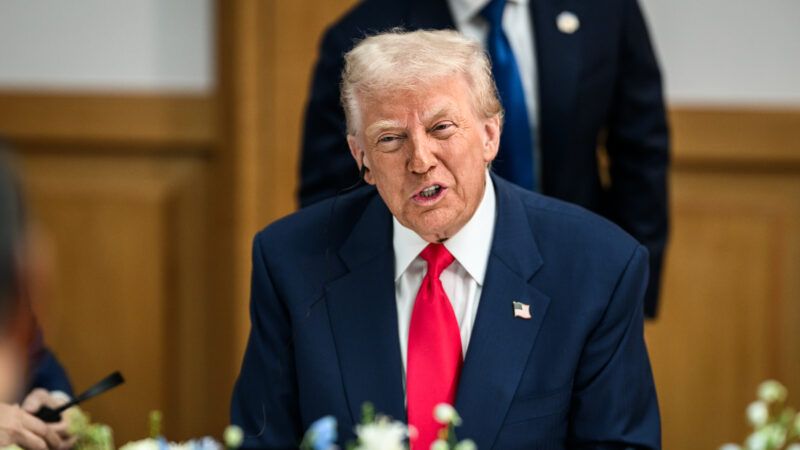According to Trump, He Has Already Saved 350,000 Lives by Murdering Suspected Drug Smugglers
There are several problems with the president's math, which suggests he has accomplished an impossible feat.

As of Wednesday, President Donald Trump had ordered 14 military attacks on suspected drug boats in the Caribbean and off the Pacific coast of Colombia, killing a total of 61 people. But according to Trump, each of those strikes prevented 25,000 drug overdose deaths, meaning he has saved 350,000 lives so far by summarily executing smugglers.
"Every boat that we knock out, we save 25,000 American lives," Trump averred during an Oval Office press conference a couple of weeks ago. "Every boat is saving 25,000 lives. The boats get hit, and you see that fentanyl all over the ocean."
That eyebrow-raising estimate resembles Attorney General Pam Bondi's absurd claim that the Trump administration had "saved…258 million lives" during its first 100 days by intercepting shipments of illicit fentanyl—an assertion that epitomized the illogic of the war on drugs. There are a few problems with Trump's math.
To begin with, Trump conflates cocaine, which is produced mainly in Colombia and is often transported by sea, with fentanyl, which is produced in Mexico and overwhelmingly enters the United States in small packages by land over the southern border. According to data from the Centers for Disease Control and Prevention (CDC), fentanyl accounts for nearly 70 percent of drug-related deaths in the United States.
The National Center for Drug Abuse Statistics says two milligrams of fentanyl is a potentially lethal dose. Trump therefore seems to be assuming that each of the boats destroyed on his orders was carrying 50 grams of fentanyl. That is pretty large for a fentanyl shipment: Between 2018 and 2023, according to a recent study, most fentanyl powder seizures weighed less than 40 grams. Even so, 50 grams (less than two ounces) is not large enough that you would see "fentanyl all over the ocean" after blowing up a boat carrying it, which underlines the point that Trump's fentanyl is imaginary.
Even if we join Trump in pretending that cocaine is fentanyl, his claim relies on two other fallacious assumptions. If those 50 grams of fanciful fentanyl had not been intercepted, he implicitly posits, they would have been delivered to 25,000 different American consumers, each of whom would have consumed his share in a single sitting, with fatal results. Trump also imagines, contrary to more than a century of experience with drug interdiction, that traffickers do not compensate for intercepted shipments by sending more. When drugs are seized or destroyed, he seems to think, the total supply available to Americans is reduced by that amount. If that were true, it would be hard to understand why Trump says drug interdiction is "totally ineffective."
Leaving aside these inconvenient details, Trump's account of what he is accomplishing by ordering the deaths of suspected smugglers, like Bondi's estimate of lives saved by less lethal anti-drug efforts that Trump now concedes were "totally ineffective," is impossible on its face. Last year, the CDC estimates, illegal drug use resulted in about 82,000 U.S. "overdose deaths." By Trump's account, he has somehow prevented more than four times as many drug-related fatalities by destroying a tiny portion of the total supply.
Trump has never let reality get in the way of a self-flattering story. But in this case, his nonsensical bragging aims to do more than show how great he is.
Trump is trying to justify murder as self-defense, obscuring the immorality and lawlessness of his bloodthirsty anti-drug tactics. Trump's unprecedented policy of killing suspected drug smugglers instead of arresting them—which has already become the new normal—simultaneously corrupts the mission of the armed forces, erasing the traditional distinction between civilians and combatants, and undermines long-standing principles of criminal justice, imposing the death penalty without statutory authorization or any semblance of due process. But he hopes his extravagant claims about hypothetical deaths prevented by intercepting imaginary fentanyl will distract the public from the actual deaths he is ordering.
